Vol.
7 No. 99 WE
COVER THE WORLD
Monday September
8,
2008
 |
Is TSA 50% Factor 100% Disaster?
Get ready for exactly half of all
air cargo that moves in or via USA to pass through mandatory TSA screening by
February 9, 2009 as expansive new security rules and regulations are set to
be rule of the land.
Assuming that many in air cargo would not quite
get the gravity of mandated security demands, TSA during the past year has been
holding “getting to know you meetings” about upcoming mandates and
changes in several American cities.
Earlier this year, the last big time air cargo
organization to confront the subject head on, IATA’s CNS Partnership Conference
in Palm Beach Florida, USA confronted TSA representatives up close and personal
as the U.S. government squared off with 450 high line air cargo professionals,
entrepreneurs and on the street cargo people.
Driven by being together and really juiced on
the subject, attendees en-masse really let TSA have it in spades, telling the
agency in no uncertain terms that while supporting security and accepting responsibility
for a safer air cargo environment all along the distribution chain, the air
cargo industry beset with competition, fuel costs, financial uncertainty and
even over the top intrusion from U.S. DOJ and EEU investigators, does not like
the TSA mandates calling for half of all air cargo to be screened by early next
year and the rest shortly thereafter.
“We are frustrated and mad as hell that
TSA seems to want to dump all responsibility for compliance to a sweeping and
outrageously expensive new technology on the doorstep of the industry,”
one attendee said.
As the TSA guy rattled on with his mandated security
shopping list that was handed down from the same Washington politicians that
the likes of McCain and Obama are promising to get rid of, a collective gasp
rose up in the room.
The TSA/air cargo encounter at CNS brought forward
one simple truth:
TSA is stuck with enforcing the collective bumbling
attempts of USA lawmakers to make stick some deadlines for security with absolutely
no idea how air cargo works.
Where TSA may have been able to insist and cajole
and poke people in smaller groups, at CNS the top USA and world air cargo leaders
told Tom Friedman, the TSA spokesman that generally air cargo thinks the TSA
plan is flawed to the point of being unrealistic and unworkable.
“The TSA and USA government is generating
this predicament,” said one attendee.
“That TSA “Call To Action” by
Ed Kelly who went “missing in action” at the CNS Conference left
the “poor soul” subordinate Tom Friedman to convey the bad news
was unfortunate, because we wanted to tell Ed what we think,” said another.
Mr. Friedman offered an overview of what the TSA
has implemented thus far (educational and test sites at several airports around
USA).
He then ended his presentation saying something
to the effect:
“So that is what the U.S. Congress has mandated;
Phase one cargo screening must be met by industry compliance at a 50% level
by February 2009 and phase two or the final phase of 100% compliance by August
2010.
“We pass it to you all for action and to
take care of meeting these requirements.”
After those words the place just went nuts.
“I have never seen such a group of executive
professionals blurt out their feelings that vigorously at what they just heard,”
was one comment.
“Plenty of well known Anglo Saxon words
of disgust and derision,” was another.
Here are some other reactions we gathered.
“The government is not funding this Certified
Cargo Screening Program CCSP, other than education meetings on the topic.”
“The air cargo industry has no idea of who
will have to bear the costs?
“Plus if we add a cost like in “surcharge”
can we expect to face a DOJ inquisitor six months to a year down the road charging
everyone with price fixing?”
But these thoughts come back as today in a presidential
election year, the U.S. Congress returns to session and air cargo may find itself
smack dab in the middle of the heavy political season of the next 90 days when
the election will be settled.
Who can be tougher on security regulation turning
the air cargo industry into a political football is all everybody needs right
now.
But undercurrent to all of this is TSA insisting:
“We have mandated law.
“Air cargo must comply so here is a helpful
kit to make that easier.”
But consider for a moment that the screening equipment
that needs to be TSA certified is not off the shelf, in fact systems are still
under review with as far as we can tell no timelines given as to when and who
gets the approval.
There are maybe perhaps in excess of 70 pieces
of scanning equipment submissions with the TSA for review.
But the TSA review team charged with evaluating
security equipment that might find widespread use in air cargo, we understand,
includes only a few people.
How will they ever be able to conclude their tests
to approve an accepted, effective cost efficient system that can then be built
and put into use in such a short period of time?
The cost range of the scanning equipment under
review is from $35K through $1.2M.
Who will pay those costs and accept the ownership
in the supply chain to meet U.S. Congress mandates for screening—will
it be shipper, trucker, forwarder, trucker, GSA handlers or airline?
Worth noting is that TSA during the aforementioned
CNS Q & A continued it’s “not my problem – you go figure
it” line of reasoning.
Don’t bet the ranch that TSA has wised up
much since the CNS gathering either.
Representatives from both the NCBFAA and AFFA
get a big job well done from us for underlining the tremendous costs involved,
and how unrealistic politically- driven security compliance demands threaten
to wipe out medium and small freight forwarder companies in air cargo altogether.
“How could the U.S. Government dump a huge
international security problem on the air cargo industry?” is growing
reaction worldwide.
One forwarder put it this way:
“Security like fuel seems to be a runaway
cost.
“In UK as example earlier this year Cathay
Pacific Cargo offered free transportation on their freighter service to DXB
and HKG ex LHR as long as forwarder pays the (fuel) FSC and (security) SSC.”
The TSA says that it is working with shippers,
but the approach as described here is viewed by some as a kind of fist in a
velvet glove approach.
But the agency, no matter how dedicated it is
to help, or to enforce cargo screening is in a no-win situation.
Also TSA is less than clear for example whether
50% screening applies to shipments other than those originating in USA or if
the law as mandated by The U.S. Homeland Security Committee means all cargo
carried on passenger aircraft from anywhere in the world.
One carrier has decided the time to get the dialogue
rolling on the subject is now, saying that it is ready to confront security
challenges later this month in the very Long Island New York Garden City Hotel
where Charles Lindbergh slept the night before taking off and flying the Atlantic
Ocean to Paris for the first time in 1927.
Whether conferees will be inspired by putting
their heads on pillows in the same hotel as the Lone Eagle remains to be seen.
But as my Dad used to say, the effort sure beats
a poke in the eye.
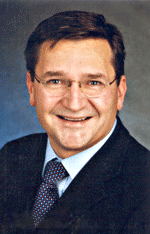 “TSA is a terrific challenge to everybody,”
says Harald Zielinski, Lufthansa Cargo Head of Security & Risk Prevention
Management.
“TSA is a terrific challenge to everybody,”
says Harald Zielinski, Lufthansa Cargo Head of Security & Risk Prevention
Management.
“The rules that TSA wants to impose worldwide
rarely take into account what is going on in other countries.
“It’s like they are selling a suit
of clothes and are imposing a one size fits all rule.
“The truth is that cargo security is and
can also be market and situational specific.
“Sure there are some basic benchmarks.
“We can only wonder how TSA would react
if Europe imposed some security rules that had to be adhered to by USA airlines,
even if in some cases those mandates made no sense?
“By implementing the regulation ahead of
schedule, we are already guaranteeing the highest security standards this year.
“We are expanding security measures with
new security hubs in Chicago and Los Angeles that include explosive detectors
at all USA stations from Autumn 2008.
“We will also host a USA Security Conference
on September 30.
“At Lufthansa Cargo’s second public
security conference and the first to be held in New York on September 30 2008,
national and international experts will discuss current trends and perspectives
in airfreight security,” Harald Zielinski said.
“In addition to analyzing the international
security situation, this special group will discuss various regulatory provisions
as well as outline technological, process and personal challenges.”
More www.lufthansacargo.de
“When the issue is air cargo security, it
might not be a bad thing for the industry to view the topic as those outside
the commercial aviation industry see it,” says John Edwards top security
officer at IATA Cargo.
“Truth is that many people in every day
life believe that air cargo on airplanes is vulnerable.
“While a good portion of that notion is
based on misinformation, like it or not in 2008, the air cargo industry is huge
with complex supply chains as freight forwarders, integrators and air carriers
strive to open new revenue streams and grow market share in an increasingly
competitive, low yield, environment.”
 “In
Bangkok September 17-19 IATA’s Fourth Cargo Claims & Loss Conference
will feature air cargo security front and center,” John Edwards says.
“In
Bangkok September 17-19 IATA’s Fourth Cargo Claims & Loss Conference
will feature air cargo security front and center,” John Edwards says.
“Many industry stakeholders are familiar
with politically driven proposals to screen 100% of cargo prior to its uplift
on a commercial flight.
“However most experts agree that, even if
this is desirable (and many believe it is not) there is, for competent security,
no silver bullet.
“While great advances in the development
and, importantly, approval of technology, that can effectively and efficiently
screen bulk air cargo are either upon us or soon to be in widespread usage,
the case for harmonization of requirements, which are, so far as is practical,
internationally recognized and accepted, appears to be strong.
“We know from experience that it is unrealistic
to target harmonization of complete national programs.
“The cultural, political and practical obstacles
are simply too large.
“But we also know, from EU initiatives and
from various edicts in the USA, that when the industry speaks with one voice,
it has a much better chance to be heard.
“Collectively the industry has the strength
and influence to enhance regulatory thinking and development, and it must exploit
this.
“Harmonization historically has primarily
been regional and focused on detailed security program requirements.
“They have not been based on a cohesive
industry harmonization strategy nor adequately coordinated.
“But now IATA Cargo is establishing principles
and priorities for global harmonization.”
Geoffrey
Isaac
Readies New Challenges
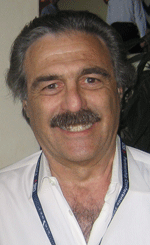 Now
that global airline cutbacks are a fact of daily life we note some great
and qualified people who are edged into new careers or seeking new situations. Now
that global airline cutbacks are a fact of daily life we note some great
and qualified people who are edged into new careers or seeking new situations.
Isaac Nijankin who built EL AL Cargo USA
for the past years and Varig Airlines Cargo for several decades before
that as Varig declined, had brought his team into the EL AL Cargo fold.
But now with fuel and competition and reductions
in service, Isaac is on the move once more but this time with valuable
global experience as he enters a new phase having departed EL AL last
Friday, September 5.
Typically upbeat, Isaac who vows he is still
ready and moving forward says that the experience with EL AL Cargo was
a major plus.
“The Middle East was always an open
question in my resume, but we built a solid result and gained valuable
experience and in the process are able and ready to do business and build
cargo programs on a global basis.
Active in the founding of TIACA, CNS and
other organizations Isaac brings a can do attitude to both the airline
and air cargo industry.
“I am ready to go,” he said.
knijankin@aol.com
|
| |
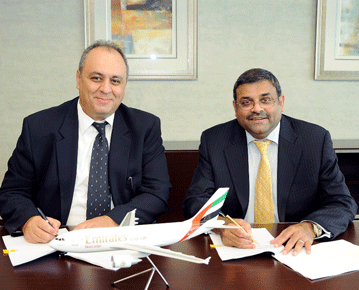
Turkish ACMI operator
KUZU Airlines Cargo has purchased three Airbus A310 freighters from
Emirates SkyCargo.
Fatih Yurdakul, KUZU Airlines Cargo CEO
pictured here sealing the deal with Ram Menen, Emirates SkyCargo top
executive.
Mr. Menen said the move is part of the
SkyCargo phase out program.
KUZU will take a phased delivery of its
new aircraft, receiving the first in this month (September) and the
other two during October and December.
|
Rail
Cargo Germany China Next
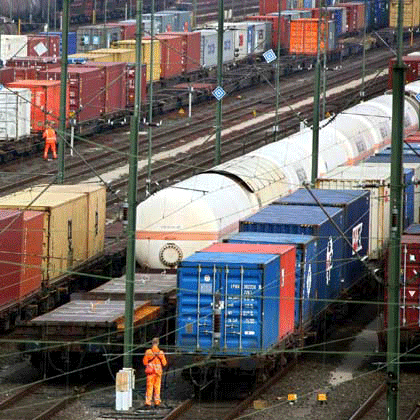 Originally
cargo rail service was scheduled to become reality some time during 2010. Originally
cargo rail service was scheduled to become reality some time during 2010.
Now however, the Eurasian train link has
got the green light for commencing service next January, bringing the
plan on track more than a year ahead of schedule.
"We intend to deploy one train per
week en route from China to Germany," revealed Deutsche Bahn CEO
Hartmut Mehdorn during a meeting with journalists in Hamburg.
Each train will carry up to 60 containers
pulling them from Beijing to Hamburg. According to Mehdorn the trips from
origin to destination will need no more than 12 days.
This new Orient Express will transit Mongolia,
Siberia, Belarus and Poland.
By pushing the project ahead, Deutsche Bahn
and its logistics arm DB Schenker want to offer the market an alternative
to the comparatively slow ocean freight and fast but highly expensive
air transport between China and Western Europe.
As a Schenker manager points out, the Eurasia
venture will be a neutral project offering co-loading to all interested
forwarders and shippers.
Sources predict that already there is some
interest from a number of Chinese firms to use the port of Hamburg as
transit point and send from that point goods onward by ocean vessels to
destinations in the U.S. Including the train transport this method of
transport would also be faster than steaming the loads from China to North
America via the Pacific Ocean logistics experts are saying.
Heiner Siegmund
|
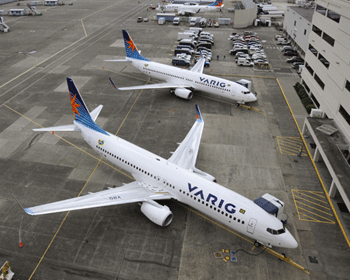 
A new air carrier is being created in Russia, the representatives of
the state corporation Rostechnologii,
the Moscow Government and
the administration of the Krasnoyarsk Territory
said in the common statement yesterday. The new company will be formed
by merging several smaller Russian air carriers such as Atlant
Soyuz, AirUnion Alliance,
Rossiya,
Kavminvodyavia, Orenburg
Airlines, Saratov Airlines
and Vladivostok-Avia. The
yet to be named carrier will base in Vnukovo
Airport (Moscow) and Emelyanovo
Airport (Krasnoyarsk) and perform both commercial and
social significant flights, to the Far East in particular
. . . Kuah Boon Kiam is President
of Shanghai-based Great Wall Airlines
October1st. Most recently the 38 year old served at Singapore
Airlines Cargo . . . Here
Emirates gets two
B777s and Varig
gets a brace of B737s. The
777-300ERand a 777-200LR is the first double 777 delivery to a Middle
East airline and the 62nd and 63rd of the model type delivered to Emirates.Varig's
new livery features a unique starburst design that appears in three different
locations on the tail as part of a variable paint scheme
. . . Gulf Air has firmed
up an order for eight new Boeing 787s, raising to 24 the total number
of new planes it is awaiting delivery….. |
 Celebrating
Ganesh Celebrating
Ganesh
Ganesh is having a birthday and New
York celebrates.
We rolled into our favorite Dosa joint yesterday
on a glorious Indian Summer Sunday and while inching up on the queue somebody
handed us some Moong Dal Halwah (a sweet delicacy) and sweetened milk
as part of the ten-day Hindu celebration of (Ganesh) Vinayaka Chaturthi.
Discovered that the Hindu Temple down the
block was serving up free canteen too.
Since the menu changes every day during
the celebration, must park our shoes next visit and sample the cuisine
while wishing our Hindu brothers and sisters worldwide Happy Ganesh Chaturthi!
Geoffrey & Sabiha
|




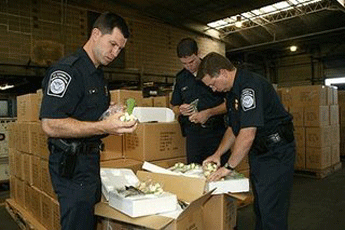
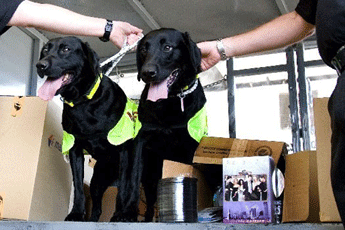
 “TSA is a terrific challenge to everybody,”
says Harald Zielinski, Lufthansa Cargo Head of Security & Risk Prevention
Management.
“TSA is a terrific challenge to everybody,”
says Harald Zielinski, Lufthansa Cargo Head of Security & Risk Prevention
Management. “In
Bangkok September 17-19 IATA’s Fourth Cargo Claims & Loss Conference
will feature air cargo security front and center,” John Edwards says.
“In
Bangkok September 17-19 IATA’s Fourth Cargo Claims & Loss Conference
will feature air cargo security front and center,” John Edwards says.